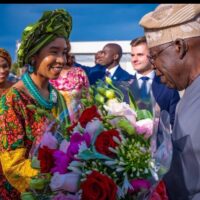The Wounding Fathers of Africa, Christianity and other Nagging Questions Part II.
The Wounding Fathers of Africa, Christianity and other Nagging Questions Part II.
Sunday, April 27, 2025 10:15 am
Ademola Araoye
Otherwise, the complexities have deepened. With the steep degradation of the practice of authentic democracy in the United States of America in the sharp direction of authoritarianism, the so-called free world that is encapsulated in the concept of an ideo-philosophically homogenous West had lost its historic leadership. The global hegemon volunteered its retirement in a preferred trajectory exhibited in the retrenchment of democracy as conventionally understood. In the same vein, Trump’s America has also denounced the traditional alliance of democratic states that has been in vogue since World War II. Along with this loss and in the climate of a pervasive threat of the resurgence of virulent nationalism across what was known as the liberal West, and somehow in quasi-liberal Latin America, is the exposed falsehoods of the basis of hegemonic assertions of the superiority of the white race and culture over all other human race.
These hegemonic falsehoods had been the basis on which the hierarchy of races and the dolorous historicity of inter-racial relations of whites and Arabs as one with a subjugated black humanity had thrived. The internal developments in the West constitute one dimension of transformative factors in contemporary global politics. This has happened in a manner never envisioned by the most perceptive analysts, both of the radical and conservative genre. Spirituality has been the other critical force in the validation of the normative principles of social organization. Implicitly, democratic practice assumes the equality and dignity of all humankind. Yet, as Sampie Terreblanche submits, Christianity at the same time was the most potent ideological vehicle of imperialism and capitalism. Christianity was thus intertwined with slavery, empire building and western capitalism. In this manner it played a critical role in legitimizing the global institution of material inequalities, race inequities, including slavery, manifestly setting the stage for imperialism through colonialism to the tragedy of mythical post-colonial statehoods and silos in post imperial Africa in which the people of Africa are trapped today.
Meanwhile, given the foundations of the warped global racial relations in Christian theology, Pope Francis has frontally engaged the dangerous reversals in the liberal principles of social organization implied by recent events in mainly Europe and the United States. The Pope made decisive pronouncements seemingly designed to undercut the social and political regression toward the revalidation of racism and virulent white nationalism, in particular the ingrained white sense of superiority against blacks. In the historic proclamation, Pope Francis challenged the current status quo, derogatory in its relation to Africa, which are entrenched in deep seated canonical precepts set in antiquity.
Allison Wiltz provides an insightful context. She informs that in 1452, Pope Nicholas V charged Alfonso of Portugal with the Christian duty to enslave any non-Christian. The Pope’s act in 1452 was the first recorded international edict to literally grant a Christian nation the right to promote, enforce, and heavily profit from slave trading. Decades later, Pope Alexander VI beckoned Christian monarchs to conquer native populations in the name of the Catholic Church, upholding his predecessor’s tradition to enslave non-Christians in whatever lands they called home. Wiltz affirms further that colonization was the preamble to every injustice Black and Indigenous people have historically experienced and even today through white supremacy. Given this history, Pope John Paul II, in an address to Cameroon intellectuals on their tasks in society and on the importance of integrating the Christian message with African culture on 14 August, 1985 apologized to black Africa for the involvement of white Christians in the slave trade. Only recently, the late Pope Francis went further in making a groundbreaking statement acknowledging contributions of Black Biblical Israelites to Christianity. He noted that the role of black Israelites had been deliberately erased from the biblical accounts by whites. He emphasized that it was time to restore historical accuracy of the role of blacks in Christian teachings. The Pope condemned the intentional distortion of biblical history for European economic and political causes, noting that particularly the way past religious institutions had whitewashed key biblical figures thereby suppressing the African and Hebrew roots of Christianity. He called out the Church’s past complicity in colonialism and racial injustice. Finally, Pope Francis urged the Vatican, Christian leaders, and faith communities worldwide to integrate these long-lost truths into modern theology. In an age of whites seeking to consolidate racial injustice across the board, the Popes declaration has sparked intense debate within the Church, with both support and resistance. Irrespective of the preferred sensibilities by vested interests, the proclamation and denunciations mark a turning point in how biblical history is understood and taught.
The implications of these developments in the Church for racial harmony are significant in illustrating the conspiratorial character of the falsehood that underpinned the tortuous historicity of blacks uprooted from Africa and subjected to untold trauma for centuries on account of doctored biblical doctrines. The false doctrines gave rise to and validated slavery and inhuman social organizational principles of Apartheid promoted by the Dutch Reformed Church (Afrikaans: Nederduitse Gereformeerde Kerk, abbreviated NGK). That church is a so-called Reformed Christian denomination in South Africa. Reflective of the nonchalant attitude of blacks, that racist Church also is also found in neighboring Namibia, Eswatini, Botswana, Zimbabwe and Zambia. The Church of the Latter day Saints or the Mormons, in the same dubious category, is another set of white racist congregants of a nebulous persuasion of the mission of Christ that denied, until the very end of the last century, the full humanity of blacks. Yet, it has a presence across a gullible Africa enticed by empty promises of investments. In Ghana, the Church in 2024 invested a mere U$ 1,7 million dollars in a project christened MCH-HOPE. In Nigeria, the membership of that Church was 232, 654 in 2023.
Meanwhile, before the proclamation of the Pope though, for comparative purposes it is imperative to highlight that those that white humanity contemptuously dubbed as “Yellow peril” and the slit eyed Asians had in less than a century forced a grudging acknowledgement of their parity as a race with the white race. They realigned the ingrained contempt of the white race for them by emancipating themselves through dint of sheer intellectual rigor, technological attainment and competitive social governance practices that transformed its peoples. As Ian Morris notes, the biggest advances in social development often come in places where methods imported do not work very well. Sometimes Morris advances that this is because the struggle to adapt old methods to new environments forces people to make breakthroughs; sometimes it is because geographical factors that do not matter much at one stage of social development matter much more at another. In effect, resilience and continuous adaptability are critical for social advancement, any people that are fixated on structure, ideas or any practice and refuse to adapt can only do so at its own peril. Africa is a prime example of destructive fixation to antiquated ideas and principles.
*Professor Ademola Araoye is a retired official of the United Nations and former Director of Abuja Leadership Center, a TETFUND Center of Excellence in Public Governance and Leadership at the University of Abuja. He is author of Sources of Conflict in the Post- Colonial African State (AWP, 2012).


 22 mins ago
22 mins ago  2 hours ago
2 hours ago  3 hours ago
3 hours ago  14 hours ago
14 hours ago  15 hours ago
15 hours ago  16 hours ago
16 hours ago  17 hours ago
17 hours ago  19 hours ago
19 hours ago
Join The Conversation